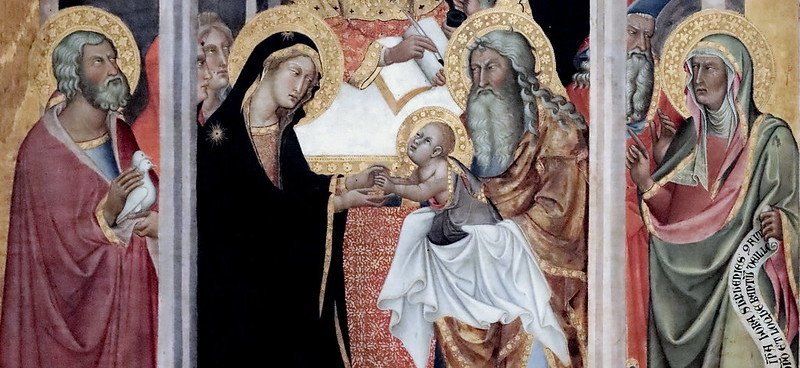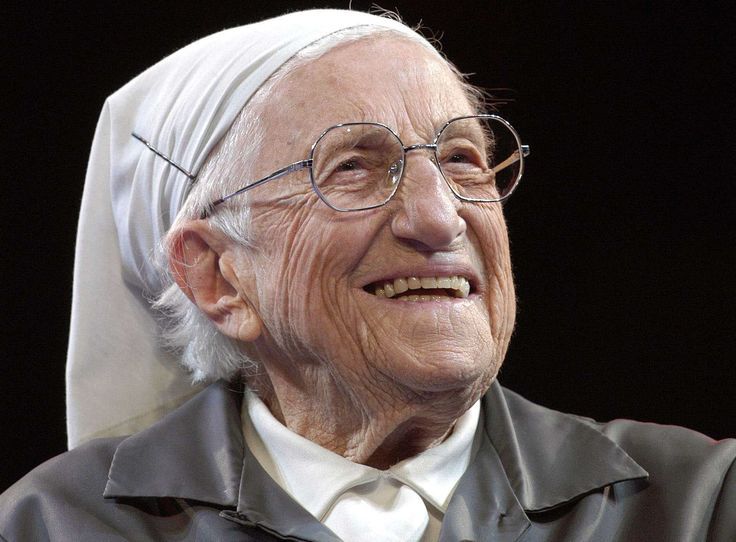Be Ready, Heart, for Parting, New Endeavour
“Now, Lord, let your servant go in peace.” I love those two venerable figures Simeon and Anna and all that they represent. The faithfulness of old age. Simeon, content, happy, ready to let go, Anna, “whose days of girlhood were over” never left the Temple, which is probably no more than the biblical way of saying “she is always in church.” Always there lighting a candle. Expressing hope with her tired body by just being there day after day. St Pope John Paul dedicated this day to the Consecrated Life and some of our monks celebrate their profession today. But I think the feast of the Presentation should also be one when we give thanks for the dedication of our Elders, our Seniors, who are the backbone of many churches and never let the candles die out. If you are one of them, it is your special day too.
Sigmund Freud, as I understand it, never wrote a line about aging, but Carl Jung had some lovely things to say about the latter stage of life. He described the first half of life as one of establishing ourselves and defining our proper place in the world, outwardly engaging with the world, achieving success at work, finding stability at home with a family.
The second half of life should not be regarded as a time of decline (outwardly it might appear so!), but one of enrichment to develop our inner selves, find meaning, a new sense of purpose and a new understanding of ourselves. What is more, the spiritual task of the second half of life is different to that of the first. Changing oneself rather than changing the world. So he says “we cannot live the afternoon of life according to the programme of life’s morning – for what was great in the morning will be little at evening, and what in the morning was true will at evening have become a lie.” The child Jesus grew to maturity, and so must we, and spiritual growth continues to the very end.
I think of Carl Jung’s words in relation to Simeon who in old age is able to embrace the mystery of Christ. He is ready to sing his Nunc Dimittis. He is ready to let go of all that has been and welcome something new. He found his meaning that day in the Temple, the object of his search, the longing of his people, the desire of the everlasting hills. And so all he can say is: Now, Lord, I am ready to go.
We sing his words every night at Compline, as the day enters the night. As we say goodbye to the things that have passed it is almost as if we are in training for that final letting go. We have to learn to sing the Nunc Dimittis. Letting go of all that has been, the contentments and regrets, roads taken and not taken, and be reconciled with ourselves and with God.
This week has been one of farewell, au revoir, adios, auf wiedersehen to the European Union. Its president Ursula von der Leyen quoted George Eliot: “Only in the agony of parting do we look into the depths of love.” Surely it is the hope of everyone that our departure is not a selfish turn, that it does not mean we become Little Britain, but that we rediscover our greatness in being a generous, big-hearted friend to our continental neighbours.
The details of Simeon’s words are interesting because there is a surprise at the end of his little song. The salvation that God has “prepared for all the nations to see” is to be “a light of revelation for the gentiles and for the glory of Israel.” The novelty lies in the order: first a light for the gentiles, and only then for the glory of Israel.” To mention Israel after the Gentiles is to convey the sense that glory consists in having a role for others, not simply living for ourselves. Can Britain see beyond its self-interest of what it can get for itself, what we can get out of something? To repeat: glory consists in having a role for others, not simply living for ourselves.
“My eyes have seen the Salvation” sings the just Israelite Simeon. The second half of life is also about seeing more deeply. We might say that if the first half of life is about law – engaging with the rules of life, the second half of life is about spirit – becoming free - going beyond the established boundaries. I love it that older people sometimes no longer care – in the best sense. They say what they think. They can say what is right. At that moment Anna comes round the corner and she can’t stop talking to everyone about the child – because like Simeon she has seen something too.
I like the title of a book by Marie de Hennezel’s that was once serialized on Radio 4. The Warmth of the Heart Prevents Your Body from Rusting. It comes from a song that the 100-year-old inhabitants of the island of Okinawa in Japan sing together as they work with heart and body in their communal gardens.
In the book she interviews Sister Emmanuelle, a well-known French nun who spent twenty years working in the shanty towns of Cairo, combating poverty and illiteracy. When the author invited her to talk about old age (she died at the age of 99), she looked her straight in the eye and said: ‘Well, you see, Marie, old age is the most beautiful period of my life. I feel as though I am rich from all the encounters I have experienced. Thousands and thousands of people have enriched me, so I have an immense store of capital, and feel responsible for passing on what I have received.’
St Luke loves encounters. He loves bringing people together to tell their stories. The old and the young. The women and the men. The Jew and the Gentile. He brings together the devout old priest Simeon and the Spirit-filled prophetess Anna to meet the child Jesus and his young parents. This encounter is different. They are the old, who allow the new to break in, they welcome it and celebrate it. This is the law letting go: handing on to light and glory. These are two people finding themselves free. I imagine the prophetess Anna as quite a free spirit. Her heart has not rusted.
When Marie de Hennezel pointed out to Sr Emmanuele that people view her as a wise woman, she retorted: “But I am not wise, Marie! I am a bit of a crank! I launch myself into adventures, and I’m unreasonable; I’ve always been like that. I always did whatever I did, come hell or high water, though nobody approved. When I became a nun, everyone laughed at me, because I was a girl who enjoyed having fun, travelling, and dancing with good-looking boys. I was a flirt. Looking good was important to me. So people said to me: ‘What on earth are you going to do in a convent?’ The others didn’t see that, deep down in my heart, I had a desire for the absolute. I flirted, and I travelled, but where was that leading me? I felt that I was made for something that doesn’t pass away…I wanted what doesn’t pass away: love, love that is free and true, for that is eternal.”
Blessed Simeon patron saint of all who, are ready to let go and embrace the eternal, Blessed Anna, whose heart was ready to sing and tell his praise. Pray for us all. And pray for our country that we become something better.
In his poem, Stages, Hermann Hesse writes:
As every flower fades and as all youth
departs, so life at every stage,
so every virtue, so our grasp of truth,
blooms in its day and may not last forever.
Since life may summon us at every age
be ready, heart, for parting, new endeavour,
be ready bravely and without remorse
to find new light that old ties cannot give.











